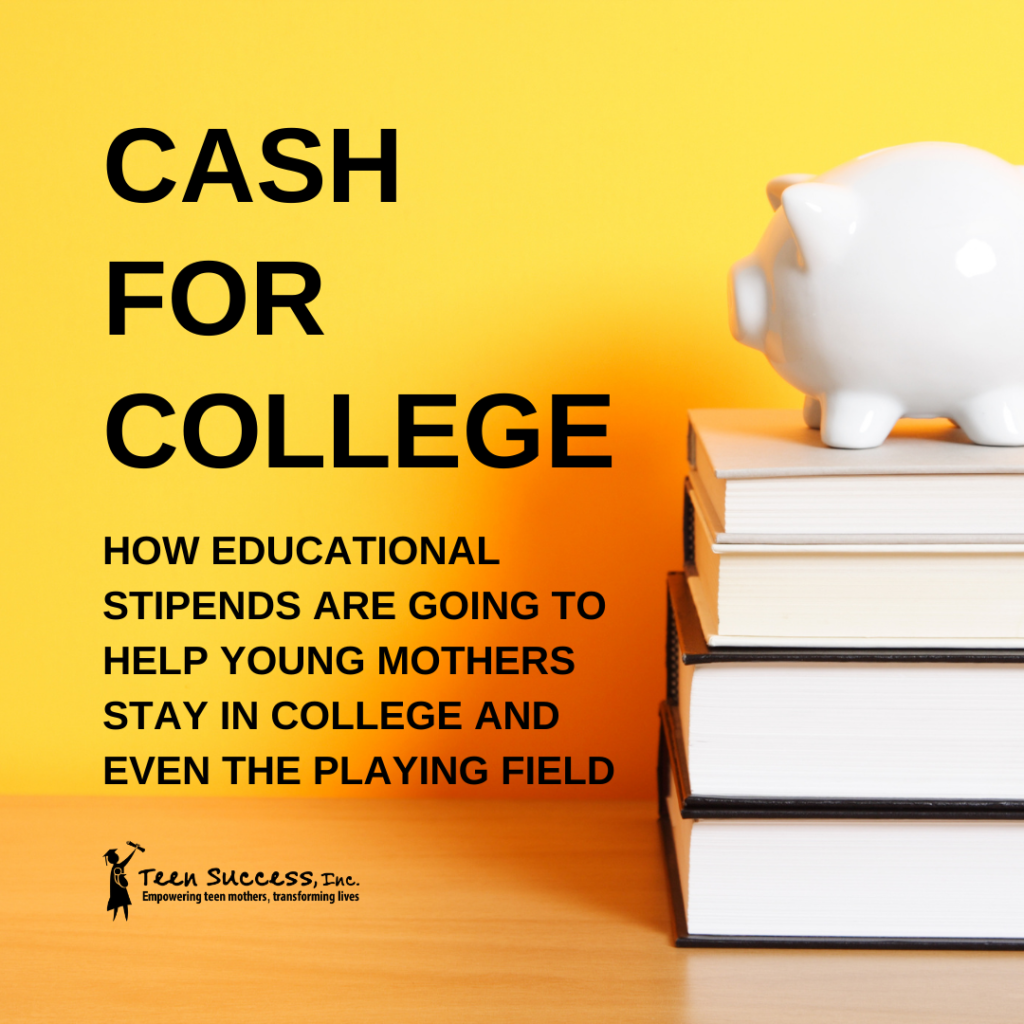
By: Diana Farias Heinrich, Communications and Marketing Manager, Teen Success, Inc.
Cash grants, stimulus checks, microgrants – an influx of cash can mean the difference between survival and ruin for people experiencing poverty. That’s why in the age of COVID-19 we’ve seen two rounds of stimulus and more potentially on the way – cash helps people make ends meet.
For the majority of young mothers Teen Success, Inc. supports, educational stipends for post-secondary education are going to be that lifeline. Having low-restrictions and coupled with financial education, educational stipends will reduce the financial barrier that is often the reason young mothers do not pursue college, career, or technical education programs.
How much education do women need to earn a living wage today?
In 2019 and 2020, before the pandemic, Teen Success, Inc. piloted an extension of its San Jose program where young mothers would continue to receive supports from Teen Success, Inc. after high school graduation, aimed at helping them access post-secondary education and persist through completion of a degree or certificate.
High school education is no longer enough to earn working women a living wage, let alone when she has children to support. In California, those with less than a high school diploma earn $23,571 annually, which is less than half of the state’s living wage of $57,096 (US Census Bureau, 2008-10 American Community Survey).
Set against an education gap where wealthier students are earning more college degrees while minority, low-income students are learning less(1), it’s a hard climb for any low-income student of color, let alone one who has a family to provide for.
Now, with the postsecondary extension of the program launched across all of its California program sites, Teen Success, Inc. is introducing educational stipends with the intent of helping young mothers, 94% of who are living in poverty, to persist through post-secondary education.
Educational stipends are a bridge to college where few exist for parenting students
Introducing educational stipends for Teen Success postsecondary participants comes at a critical moment when minority and low-income college enrollment is at record lows due to COVID-19.(2)
To support young mothers who want to pursue post-secondary education, Teen Success, Inc. is now providing educational stipends to all of its participants pursuing any kind of post-secondary degree or certificate, for as long as it takes.
The $500 educational stipends, distributed every six months, are to be spent at each young mother’s discretion to address her individual barriers to getting an education – whether that’s tuition, fees, books, equipment, internet, transportation, childcare or anything else she may need. Educational stipends are a step up to making college work in a young mother’s everyday life and will help shoulder the sacrifices she has to make to provide for her family now and in the future.
Although the stipends will reduce financial barriers to pursuing post-secondary education, they won’t replace the need for young mothers to work full time, especially given their limited access to other means of financial support. Though many students can apply for financial aid, a majority of the young women in Teen Success do not qualify because they are not taking full college course loads. Progress is slow, sometimes inching forward one class at a time because they’re working full time. Educational stipends from Teen Success, Inc. don’t have a full-time college course requirement and let young mothers attend school at their own pace.
“One of my young moms has been struggling to meet the necessary requirements for the San Jose City College Promise program. [Students] must take fulltime coursework, or 12 units, and pass all classes to receive the program’s [financial] benefits, and for her, with two babies and two jobs, it became too much to handle,” says Susana Hernandez, Teen Success, Inc. Advocate.
Finishing high school is just the beginning – parenting students have a long way to go
When young mothers graduate high school, continuing on to college is like starting at ground zero in terms of childcare and transportation, with the additional barrier of having enough money to pay for classes, books, and school supplies. Little, if any, supports exist at the post-secondary level for parenting students and stigma continues to plague them and their families.(3)
Over 7 years, Teen Success, Inc. awarded 73 competitive scholarships to young mothers pursuing post-secondary education. However, the demand for financial support to pursue post-secondary education was much higher among the 1,500 families Teen Success, Inc. has served over the years. Every year, Teen Success, Inc. declined dozens of applications for scholarships because there were not enough funds to distribute to all of the applicants.
Moving from competitive scholarships for some, to educational stipends for all, is critical to an equitable approach to increasing the probability that young mothers will finish a post-secondary degree or certificate that will lead to living wages and benefits for their families.
Nationally, only 2% of young mothers will graduate college by the time they are 30. Competing responsibilities from working to put food on the table, to taking time off because their child is sick and can’t attend daycare, all contribute to this low rate of graduation, even though more women than ever are graduating from college.(4)
Education inequity is a solvable problem, educational stipends are an important piece of the puzzle
Educational stipends will allow Teen Success, Inc. to support every young mother in her pursuit of higher education. She will have the freedom to use the dollars as needed to best support her education and her family’s wellbeing.
Teen Success, Inc. believes education is key to breaking the cycle of poverty and educational stipends are an equitable way of enacting its mission. Educational stipends will help young families on their path to thriving futures by removing some of the financial barriers post-secondary education imposes on young mothers.
Sandra Morin, Teen Success, Inc. Advocate, said of the impact of educational stipends: “Most of these young moms are first-generation college students, so that in itself is an amazing feat. They don’t think they can enroll in college or even know where to start. The dream is there, the motivation for school, but they feel stuck. I let them know that Teen Success will be helping them financially and it’s a sigh of relief, one less thing they have to stress about. The funds can help them pay for childcare when they’re in school, or that much-needed laptop so they can complete their assignments. It’s such a positive thing that they get to be that role model they want to be for their child.”
Sources
- https://hechingerreport.org/policies-help-students-pay-college-continue-shift-toward-favoring-rich/
- https://www.abc10.com/article/news/health/coronavirus/community-college-enrollment-falls-amid-coronavirus-pandemic/103-c5116e9f-b68e-4821-be7f-00e5554cb5f5
- https://www.thelily.com/she-said-she-had-to-breastfeed-during-virtual-class-her-professors-reply-shocked-her/
- https://www.pewresearch.org/fact-tank/2019/06/20/u-s-women-near-milestone-in-the-college-educated-labor-force

